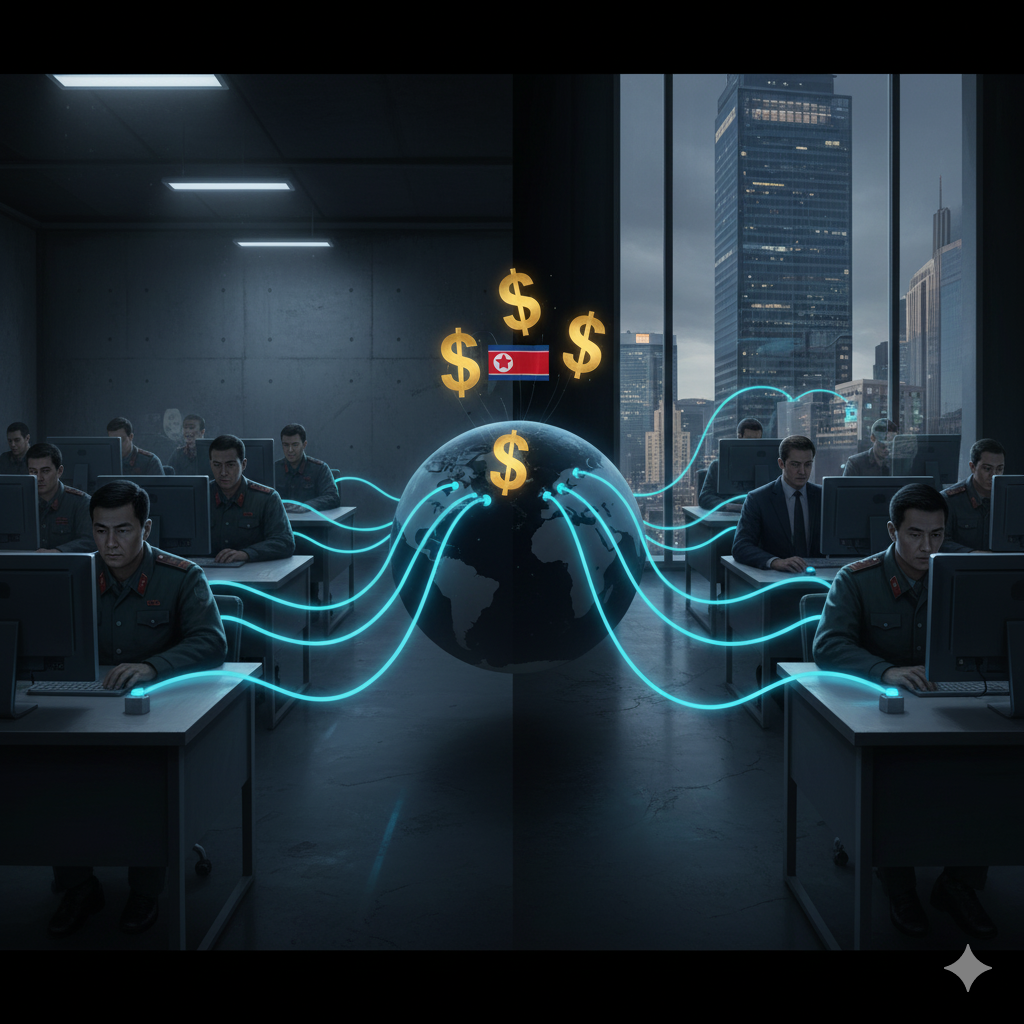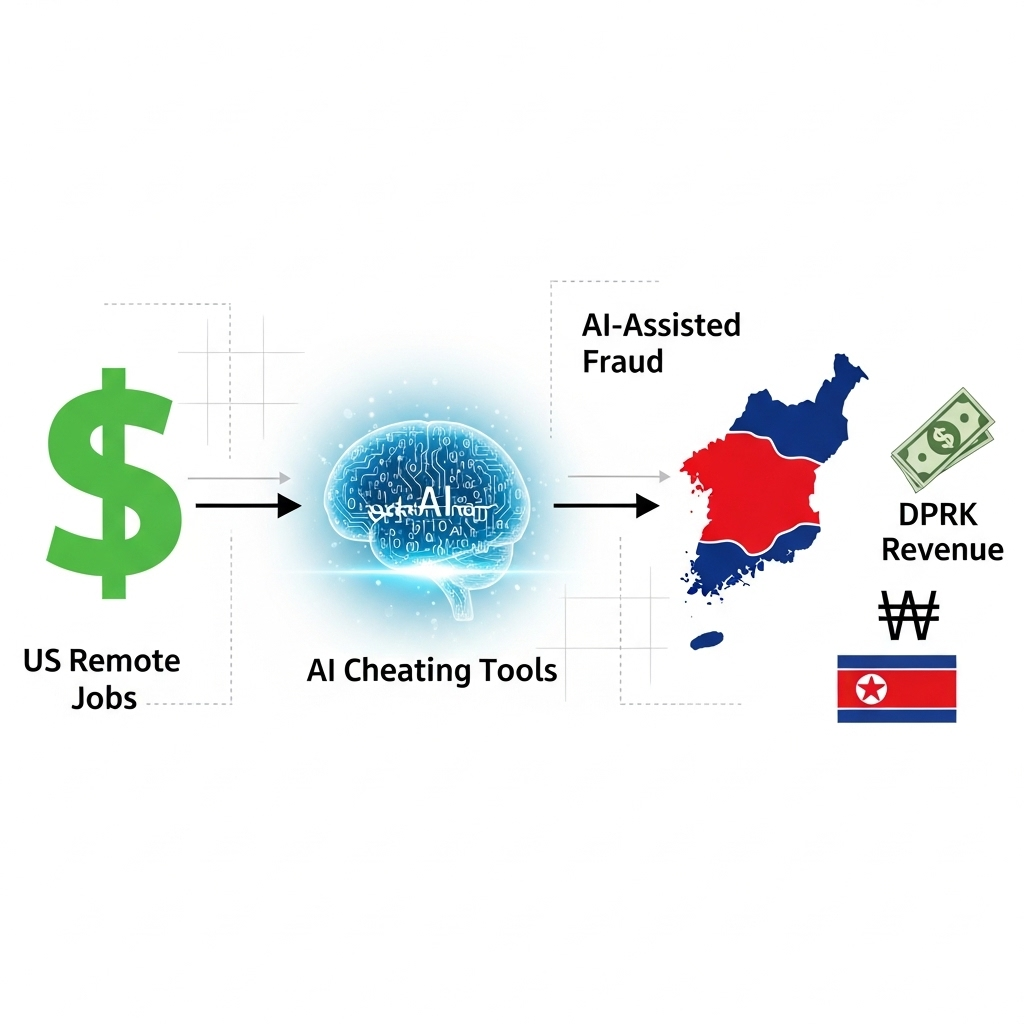Introduction – A Shocking AI-Powered Job Scam
The shift in job market has been happening rapidly, with remote work and AI-led hiring — but now a worrying trend is coming to light. North Korea has been inundating the American job market with IT workers who are employed around-the-clock, not for espionage operations and cyber-attacks, but would supply hundreds of millions of dollars in revenue flows directly to a malign DPRK regime, reports indicate.
The twist? These workers are said to be using AI filters, deepfake-style video tools and AI interview cheating programs to get lucrative US jobs. By obscuring their identities and whereabouts, they pose as actual remote workers getting well-paying I.T. contracts.
Industry insiders say this isn’t merely your run-of-the-mill fraudster scamming a free lunch — rather, it’s an organized endeavor that trained workers are running using state of the art job interview cheating AI to get pushed through the line undetected.
For companies, the danger comes on two fronts: they are unwittingly financing North Korea’s economy and employing people whose capabilities have not been accurately reflected in their AI-assisted interviews. For the United States job market, this raises questions about safety, trust and whether hiring is being conducted fairly.
How the AI Cheating Works

To understand why this is happening, tune in to some AI tools used for pulling one over during interviews. North Korean labour they are said to depend on:
AI Filters & Voice Tools: Changes accents and customizes communication, enabling candidates to speak as US-based professionals.
Deepfake Video Filters: Some job candidates are using artificial intelligence-powered avatars for a more realistic camera profile that keeps them from getting caught by recruiters by their real identities.
AI Interview Bots: Apps designed to give you real-time answers to interview questions that make candidates look 10 times more amazing than they could possibly be.
Cheating With AI-Coded Tests: When companies call for technical tests, workers in North Korea will occasionally tap into A.I. coding assistants such as ChatGPT or GitHub Copilot to breeze through them in no time.
The AI-powered deception has made the scheme disturbingly effective. These workers are reported to have already transferred millions or potentially billions of dollars to North Korea’s treasury.
For businesses, the risk is not just in hiring an unqualified developer — it’s in unwittingly stoking one of the most sanctioned regimes on earth.
Why the US Job Market Is the Target

The US is now the epicentre of these AI-driven job scams, and it’s easy to see why:
Good Pay in IT – The average developer can easily become a six-figure earner here in the States. This is a goldmine for North Korea.
Remote Work Explosion – It has become the new norm to “intermingle” with your colleagues, but jobs hired at a distance can slip in under the radar that much more easily.
Skilled Tech Worker Demand — The lack of developers in the US has led companies to source talent from abroad, sometimes vetting them less thoroughly.
Simple With AI Rather, between resumes and profiles being enhanced with AI and interview bots, it’s never been simpler to finesse the hiring process.
This exploitation is more than just a money grab — it’s also a national security threat. Infiltration of the job market: Through its use of workers, North Korea is able to access US business networks and sensitive systems and information.
It’s a sign that AI interview cheating is no more just an individual hack — it’s also now a state-sponsored initiative.
The Role of AI in Supercharging Fraud
AI was always thought of as a double-edged sword. Where companies are embracing it to improve hiring, scammers are deploying the same technology with the reverse aim: to game that system.
Resume Optimization: Artificial intelligence tools produce the perfect resume that matches job descriptions.
Interview Assistants AI “whisper bots” send answers directly into the ear during Zoom calls.
Language Polishing: AI-powered grammar checkers and vocal modulators mask regional phrases and, in doing so, helping non-native speakers sound more fluent.
Identity Masking: The use of Deepfake video overlays or AI-generated photos that make it impossible to confirm whether the candidate is who they claim to be.
It is the ideal loophole for North Korea. Remote work scams are also more difficult to prosecute (unlike cybercrime, which usually leaves a trail). The worker is “just doing their job,” but behind the scenes, millions of dollars return to the regime.
This is the seedy side of AI in recruitment — rather than levelling the playing field, it’s opening the door to industrial-scale fraud.
How Much Money Is Involved?

North Korea is believed to have pocketed hundreds of millions of dollars from the scam, according to estimates. Some analysts say that the figure could even reach a half-billion dollars annually, depending on how many workers are implicated.
Here’s why the figures are so high:
It’s when You can make between $80,000 – $120,000 per year working remotely as a single IT job in the United States.For developers.
If 1,000 North Korean laborers land those kinds of jobs, that’s more than $100 million a year.
Scaling up, with a few thousand workers, hundreds of millions of dollars are soon crossing the revenue line.
Those funds are critical for North Korea, which is under severe sanctions and isolated from global financial networks. When the regime skirts sanctions through AI interview cheating, it evades constraints and infuses foreign cash into its failing economy.
That’s not just fraud, financially speaking; it’s misallocation of opportunities in the US job market: Good developers could be losing work to AI imposters.
Risks for US Companies and Security Concerns

Hiring a North Korean worker through this program isn’t just bad hiring — it’s dangerous from a national security perspective. Companies face:
Legal Exposure: You could be fined or otherwise punished for paying sanctioned individuals.
Data Breaches: Workers may touch sensitive business data or even government connected systems.
Reputation: Picture finding out your “star developer” was a charlatan resident of the DPRK.
Unpredictable Performance: Some workers, once hired, may not be able to follow through on their AI-assisted interview promises.
The FBI and cybersecurity professionals have already alerted companies about the increasing risk of remote worker fraud enabled by AI. But many businesses do not have what they need to detect it.
That pushes it to recruiters and HR teams to escalate their process of verifying candidates, using more thorough background checks and AI detection technology.
The Future of Hiring in the Age of AI Cheating
The era of AI interview cheating is born Today, as desperate Chinese try to scam their way into global companies Recruiter’s hiring process index skyrockets — how to apply predictive analytics and improve your hiring efficiency These days when job candidates look up advice on Forbes or other media about beating the machine and getting short-listed for competitive roles at renowed companies, they frequently find articles titled “Stop that cheater” or “Interview cheat sheet”. If not stopped, companies might experience rampant fraud, a compromised of security and the erosion of trust in working from home systems.
But there are solutions:
Tougher Verification: Identity verification, biometric checks and location audits in place.
AI vs. AI: Using detection software that can identify voices, videos or résumés made by A.I.
Policy Action: Governments should introduce rigorous legislations to mitigate state sponsored job scams.
Awareness Campaigns: Companies need to be educated on the perils of AI-driven fraud.
In the long run, the US job market will have to adjust by constructing more trust-focused hiring systems that thread the needle between access and security.
North Korea’s progress demonstrates how fragile the current system is. But it also highlights the urgency of preparing for a world in which AI can both empower and deceive.
So at the very least, for now, the tale of A.I. interview cheating isn’t just a story about grifters getting away with fraud — it’s also a wake-up call for the entire global work force.
Discover the hottest AI tools across the globe

Comments